Here is my recent RT interview about the German missile hack:
German missile hack from Annie Machon on Vimeo.
Here is my recent RT interview about the German missile hack:
German missile hack from Annie Machon on Vimeo.
This week I made my first visit to the re:publica annual geekfest in Berlin to do a talk called “The War on Concepts”. In my view this, to date, includes the four wars — on drugs, terror, the internet, and whistleblowers. No doubt the number will continue to rise.
Here’s the video:
republica_2015_Annie_Machon_The_War_on_Concepts from Annie Machon on Vimeo.
Last week artist Davide Dormino unveiled his sculpture celebrating whistleblowers in Alexanderplatz, Berlin.
Called “Anything to Say?”, the sculpture depicts Chelsea Manning, Edward Snowden and Julian Assange standing on three chairs, with an empty fourth chair beside them, upon which we are all encouraged to stand up on and speak our truth.
Davide invited me to do just that for the unveiling ceremony, along with German MP for the Green Party and whistleblower supporter, Hans Christian Stroebele and Wikileaks’ Sarah Harrison. Here’s a report:
Anything_to_Say?_sculpture_unveiled_in_Berlin from Annie Machon on Vimeo.
I am very happy to announce a new initiative, Code Red, that Simon Davies (the founder of Privacy International and The Big Brother Awards) and I have been organising over the last few months. In fact, not just us, but a panoply of global privacy and anti-surveillance campaigners from many areas of expertise.
Simon and I have known each other for years, way back to 2002, when he gave one of the earliest Winston Awards to David Shayler, in recognition of his work towards trying to expose surveillance and protect privacy. That award ceremony, hosted by comedian and activist Mark Thomas, was one of the few bright points in that year for David and me — which included my nearly dying of meningitis in Paris and David’s voluntary return to the UK to “face the music”; face the inevitable arrest, trial and conviction for a breach of the Official Secrets Act that followed on from his disclosures about spy criminality.
Anyway, enough of a detour down memory lane — back to Code Red. Regular readers of this website will know that I have some slight interest in the need to protect our privacy for both personal reasons and societal good. Over the last 18 years since helping to expose the crimes of the British spies, I have worked with the media, lawyers, campaigners, hackers, NGOs, politicians, wonks, geeks, whistleblowers, and wonderfully concerned citizens around the world — all the time arguing against the encroaching and stealthy powers of the deep, secret state and beyond.
While many people are concerned about this threat to a democratic way of life, and in fact so many people try to push back, I know from experience the different pressures that can be exerted against each community, and the lack of awareness and meaningful communication that can often occur between such groups.
So when Simon posited the idea of Code Red — an organisation that can functionally bring all these disparate groups together, to learn from each other, gain strength and thereby work more effectively, it seemed an obvious next step.
Some progress has already been make in this direction, with international whistleblower conferences, cryptoparties, training for journalists about how to protect their sources, campaigns to protect whistleblowers, activist and media collectives, and much more. We in Code Red recognise all this amazing work and are not trying to replicate it.
But we do want to do is improve the flow of communication — would it not be great to have a global clearing house, a record, of what works, what does not, a repository of expertise from all these inter-related disciplines from a round the world that we can all learn from?
This is one of the goals of Code Red, which launched to the media at the International Journalism Festival in Perugia a few weeks ago. We were then lucky enough to also hold a launch to the tech/hacktivist community in Berlin a few days after at C Base — the mother-ship of hackers.
Here is the film of the Perugia launch:
Code Red — launched in Perugia, April 2015 from Annie Machon on Vimeo.
The AcTVism Munich media collective is releasing a film on 19th April featuring Noam Chomsky, The Real News Network’s Paul Jay and myself.
Filmed last January, we discussed the old and new media, activism, and much more.
Here’s the trailer:
AcTVism Trailer — Chomsky, Machon and Jay from Annie Machon on Vimeo.
First published on RT Op-Edge
Two horrors have dwelt in my mind for the last twenty years, ever since I read reports about terrorist groups while an impressionable young intelligence officer. The first involves the use of power tools as instruments of torture; drills, industrial sanders, angle grinders. This is no secret now and the meme has been much used and abused by Hollywood and series such as “24”, but I still feel uncomfortable every time I am dragged into the “boy toy” section of a home improvement mega-store.
The second has recently hit the news as a grim result of ISIS, the ultra-violent Sunni sect that has swept across much of Syria and Iraq, imposing the most draconian form of Sharia law in its wake upon the hapless citizens of formerly secular states. I pity the poor women, and I pity still more the men of these communities faced with the option of submission or gruesome murder.
For this is the other image that haunts me: in 1995 six western tourists were abducted by a Kashmiri separatist group, Al Faran. One of the abductees, a Norwegian called Hans Christian Ostro, was found decapitated, his head had been hacked off with a knife. The sheer horror, the terror the poor man must have experienced, has haunted me ever since.
You can probably see where I am going with this. I have not watched, nor do I have any intention of ever watching, the ISIS video of the gruesome murder of US journalist James Foley, whether the Metropolitan Police deems it a crime to do so or not. I just feel horror, again, and a deep well of sorrow for what his family and friends must be going through now.
Yet this is nothing new — we have known for months that ISIS has been beheading and crucifying people as they rampage across Syria and Iraq. There has been a steady stream of delicately pixilated heads on spikes in the western media, and the outrage has been muted.
And indeed, such beheadings have long been carried out and filmed during the earlier insurgencies in Iraq — I remember a young film maker friend who had stumbled across just such a sick propaganda video way back in 2007 — he could not sleep, could not rid his mind of the images either.
It is barbarity pure and simple, but it is also effective within the boundaries of its aims.
So, what are these aims? I just want to make two points before the West gets swept up in a new wave of outrage to “bomb the bastards” for beheading an American — after all, many hundreds if not thousands of people across the Middle East have already suffered this fate, to lack of any meaningful Western outcry.
Firstly, ISIS has clear aims (indeed it published its five-year plan to great media derision a couple of months ago). It is effectively using hideous brutality and propaganda to spread terror ahead of its war front — this is a 21st century blitzkrieg, and it’s working. The sheer horror of what they do to any who attempt to resist is so great that apparently whole armies abandon their weapons, banks have been left to be raided to the tune of half a billion dollars, and entire villages flee.
This is the pure definition of terrorism, and we can see that it is working. ISIS is doing all this to build a new state. or caliphate, in the way that their warped fundamentalist interpretation of religion sets out for them.
Secondly, and here’s the contentious bit, how precisely is this different from the terror that the Israelis have been visiting upon the many innocents killed in Gaza? The Dahiya Doctrine of disproportionate violence to stun and quash resistance was exposed by Wikileaks — the Israeli “shock and awe”. And also, how is this different from what the US has been meting out to the peoples of Yemen, Somalia, Pakistan and Afghanistan over the last few years with their drone attacks?
All the above examples show strong military forces, ideologically motivated, unleashing violence and terror on a huge, disproportionate scale on innocent populations that have nowhere really to run.
The difference being? ISIS wields its own knives, does its own dirty work, and proudly films its grotesque brutality to cow its opponents. This is primitive terrorism intersecting with social media, a bastard spawn of the 21st century. And it still seems to be effective, just as terror of the guillotine resonated throughout revolutionary France in the 18th century.
On the other hand, the US and Israel prefer to be a bit more coy about their terroristic strategies, hiding behind such phrases as “proportionate”, “self-defence”, “precision bombing” and “spreading democracy”. But who, seriously, falls for that these days?
Their armed forces are not directly getting their hands dirty with the blood of their victims: instead, spotty young conscripts safely hidden in bunkers on the far side of the world, mete out death from the skies via sick snuff video games — officially called “precision” bombs and drone attacks that take out whole families. Heads can be blown off, bodies eviscerated, limbs mangled and maimed, and all from a safe distance.
We had the first proof of this strategy with the decrypted military film “Collateral Murder”, where helicopter pilots shot up some Reuters journalists and civilians in Iraq in 2007. That was bad enough — but the cover-up stank. For years the Pentagon denied all knowledge of this atrocious war crime, and it was only after Wikileaks released the information, provided by the brave whistleblower Chelsea Manning, that the families and the international community learned the truth. Yet it is Manning, not the war criminals, who is serving a 35 year sentence in a US prison.
Worse, by sheer scale at least, are the ongoing, wide-ranging unmanned drone attacks across the Middle East and Central Asia, as catalogued by the Bureau of Investigative Journalism in the UK. Many thousands of innocents have been murdered in these attacks, with the US justifying the strikes as killing “militants” — ie any male over the age of 14. The US is murdering children, families, wedding parties and village councils with impunity.
And then the infamous provisions of the US NDAA 2012. This means that the US military can extra-judicially murder anyone, including US citizens, by drone strike anywhere in the world with no trial, no judicial process. And so it has come to pass. American Anwar Al Awlaki was murdered in 2011 by a drone strike.
Not content with that, only weeks later the US military then blew his 16 year old son to pieces in another drone strike. Abdulrahman — a child — was also an American citizen. How, precisely, is this atrocity not morally equivalent to the murder of James Foley?
So what is the real, qualitative difference between the terror engendered by ISIS, or by the Dahiya Doctrine, or by the US drone strike programme? Is it just that ISIS does the dirty, hands on, and spreads its message shamelessly via social media, while the US does the dirty in secret and prosecutes and persecutes anyone who wants to expose its egregious war crimes?
I would suggest so, and the West needs to face up to its hypocrisy. A crime is a crime. Terrorism is terrorism.
Otherwise we are no better than the political drones in George Orwell’s “1984”, rewriting history in favour of the victors rather than the victims, acquiescing to eternal war, and happily mouthing Newspeak.
New Terrorism, anyone?
Here’s my interview from yesterday on RT’s excellent Breaking the Set show with host, Abby Martin. We discussed all things spy, surveillance, Snowden, oversight, and privacy. A fun and lively interview! Thanks, Abby.
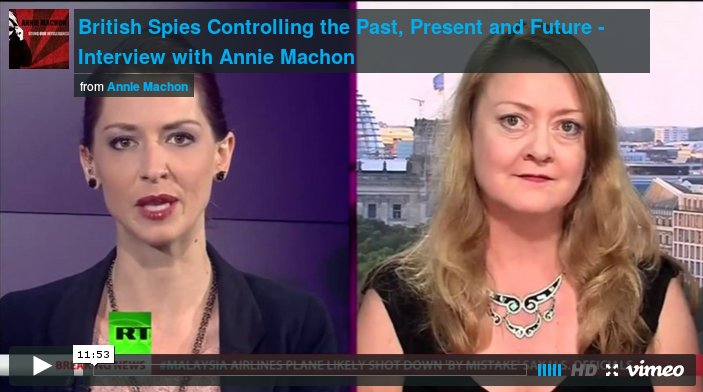
A comment piece from last week on RT about German politicians wanting to go back to paper-based communications to evade the US spy panopticon:
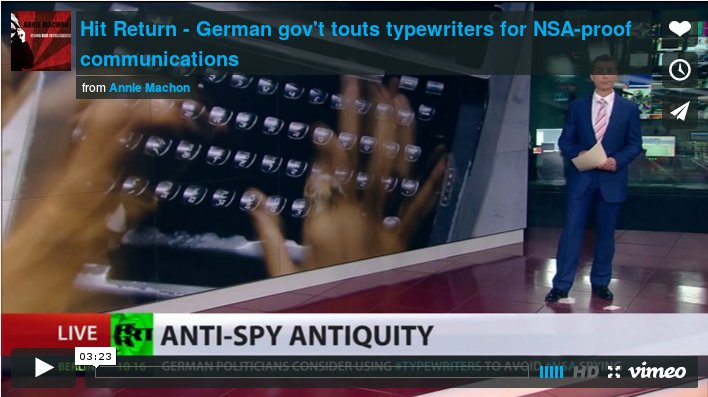
And here is the full text of the interview I gave on RT Op Edge:
Both typewriter and strong encryption is going to slow down communication, but upholding a basic democratic right of privacy seems to be more important, former MI5 agent Annie Machon told RT.
Amid the American-German espionage scandal, German politicians are considering going back to old-fashioned manual typewriters for confidential documents in order to protect national secrets from American NSA surveillance.
RT: Why would Germany think of using typewriters as a security measure?
Annie Machon: What I find interesting is that we have a situation where even our democratically elected representatives have to think deeply and seriously about how to protect the privacy of their communications, particularly when the investigation of the very subject of invasion of the privacy of the citizens, which is what the Bundestag at the moment is doing in Germany, trying to hold hearings to work out what exactly the NSA has been doing, which might be contravening the constitution of Germany. It is very difficult now but it is still possible to protect your electronic communications, but I think this announcement, this sort of statement by the Bundestag representative about going back to typewriters is interesting. It just makes a very strong point that we all need to be aware of the fact that we can be spied on at any time.
RT: Do you think everyone would follow Germany’s example?
AM: I think more and more people are concerned about their privacy because of the Edward Snowden disclosures. He has done the world a huge service with great personal cost, exposing the predations of the US Intelligence agencies and the NSA particularly, as well as a number of European agencies. In the past all countries spied on each other because they wanted to gain advantage over other countries, not necessarily their enemies, just an advantage economically or politically. However, what we are seeing at the moment is the result of what was the perfect storm for the USA in the 1990s, it was a perfect opportunity for them, because at that point the Cold War had ended, they were the sole remaining superpower on the planet, and precisely at that moment we had the evolution of the internet, a huge tech explosion of communications. They saw the opportunity and they went for it. Of course they did because that meant that they could embed whatever they wanted into the infrastructure that the whole world now uses for communication. Of course they were not going to turn this opportunity down, and they haven’t. That is what Edward Snowden disclosed.
So we have the situation now when everything can conceivably be hoovered up by the NSA and its vassal states in Europe, everything can conceivably be stored for ever and be used against citizens in the future if the laws change. And everything can conceivably be known amongst the private deliberations of our parliament’s democratically elected representatives. It’s worse than Orwellian.
It would be naïve to think that the US would not take up this opportunity, but of course they did, and these are the results we are living in. It would be lovely to think that we could go back to the era of having privacy in our lives that our governments would have power to ensure we had it, but in this globalized world it is very difficult to ensure that. One of the things that is little known out of all Snowden’s disclosures is the fact that it is not just what we send over the internet, it is also hardware, the computers, the technology we actually use that can already be compromised by the NSA. This is one of the things that came out just after Christmas last year. So we are living in a very complex world but there are very simple steps we can take, both the governments and the citizens, to protect our democratic and our basic right to privacy.
RT:Wouldn’t using typewriters slow things down in terms of communication? Why not use other, more modern ways of protecting communication?
AM: Either going back to using pen paper or typewriter or using very strong encryption is going to slow down one’s communication, there is no doubt about it. The point is though, what is more important, is it access to the latest celebrity gossip on the internet or is it actually upholding a basic democratic right of privacy. Because if we don’t have privacy, then we lose our freedom to communicate easily and in private, we lose our freedom to ingest information via video, audio or from reading, we cannot plan, we cannot conduct private personal relationships over the internet. So what is the price of a little bit of inconvenience when it comes to protecting our basic rights? I think that however light-heartedly the German politician mentioned using typewriters, when it comes to proper security issues within government, he is probably absolutely right. Last year there was a report as well, saying that some of the Russian security operators were now using typewriters too. We will all have to think about that, and it’s just a jolting wake up call to make us all think about that by stating that the German government is now going back to typewriters for certain things.
RT: What kind of solution do you see? Should people rely on their governments for protection of their privacy?
AM: There is a danger that people and the government will become very paranoid about trying to protect against the predations of the NSA and its vassals in Europe. However, I’m not sure as we as citizens can rely on governments to protect our privacy because all governments would want to know what is going on on the internet for legitimate reasons as well, to try to track down the illegitimate criminals and terrorists. But it can be easy for them to hoover up all the personal information and we, as citizens, need that have that guarantee of privacy. So one of the things we can do as citizens is to take responsibility in our own hands. We can indeed source all technologies, source computers pre-2008 that have not built-in hardware backdoors. We can use decent PGP encryption, we can use Tor to hide what we are looking at in the internet, we can use other encryption methodologies to protect our privacy, and we need to. I think it’s a very interesting crossroads in our history, both as civilizations, as democracy and as individuals, but also how we view the technology, how we use it, how we can better use it to protect our life, so that is going it be an ongoing debate. I’m very pleased to see this in Germany particularly. The politicians seem to be waking up around these issues and wanting debate these issues because the USA has got away with it for long enough across the West.
With thanks to Free Press Unlimited, the Dutch Advice Centre for Whisteblowers, Network Democracy, and the Whistleblowing International Network.
All these organisations came together to hold an international conference in support of whistleblowers on 18th June in Amsterdam.
It was a creative event, mixing up lawyers, journalists, technologists and whistleblower support networks from around the world at an event with speeches and workshops, in order for everyone to learn, share experiences, and develop new methodologies and best practice to help current and future whistleblowers.
A stimulating and productive day, at which I did the opening keynote:
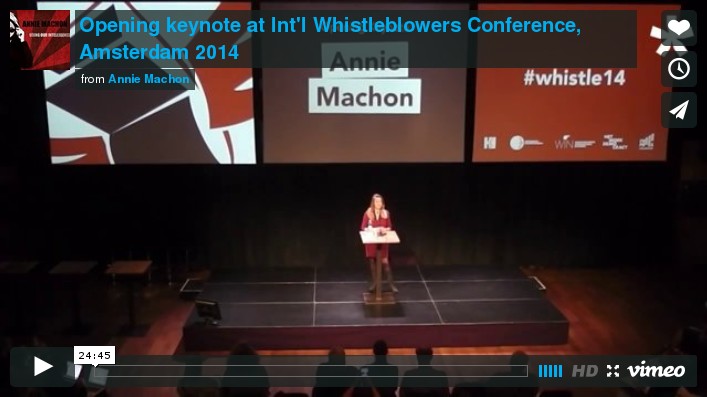
Here is an interview I did on 5th June, the anniversary of the start of Edward Snowden’s disclosures about the global surveillance infrastructure that is being built.
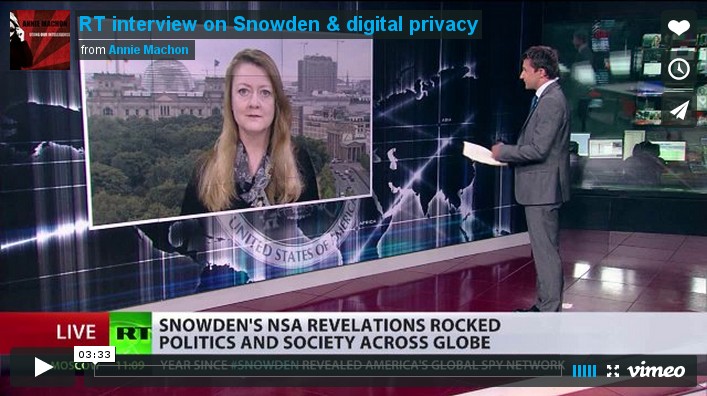
RT interview on Snowden & digital privacy from Annie Machon on Vimeo.
Here is a panel discussion I did at the International Journalism Festival in Perugia, Italy, in May 2014:
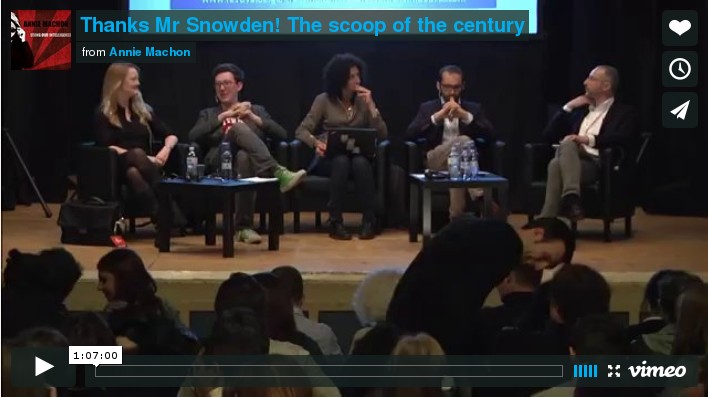
I recently had the pleasure of taking part in a debate at the Oxford Union Society. I spoke to the proposition that “this house believes Edward Snowden is a hero”, along with US journalist Chris Hedges, NSA whistleblower Bill Binney, and former UK government minister Chris Huhne.
The chamber was full and I am happy to report that we won the debate by 212 votes to 171, and that Oxford students do indeed see Edward Snowden as a hero. Here is my speech:
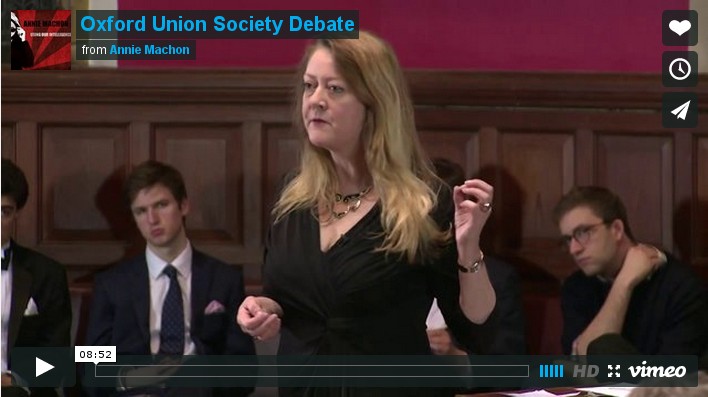
Last month I was on a panel discussion at the Berlin Transmediale conference with NSA whistleblower Bill Binney, Chelsea Manning rapporteur Alexa O’Brian, and activist Diani Barreto. Here is the link to the full two hour event, and here is my speech:
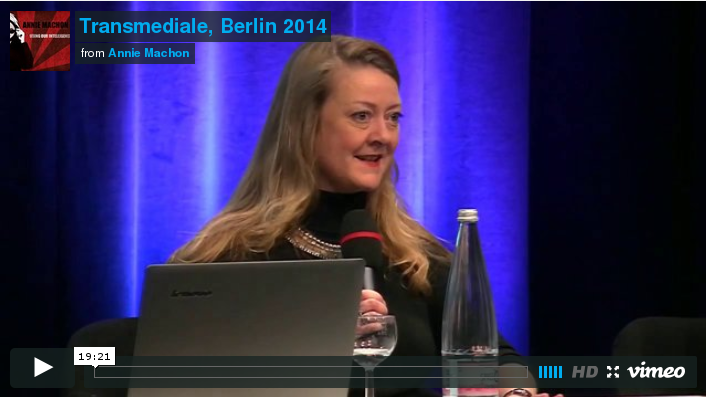
 Rather than the usual run-of-the-mill narcissism, the phrase “welcome to the Annie Zone” is more usually uttered in despairing tones when my über-geek partner is faced with yet another inexplicable tech failure of laptops and phones in my proximity.
Rather than the usual run-of-the-mill narcissism, the phrase “welcome to the Annie Zone” is more usually uttered in despairing tones when my über-geek partner is faced with yet another inexplicable tech failure of laptops and phones in my proximity.
I just tell him that he should see me as the ultimate geek challenge.…
However, for the purposes of this blog, the Annie Zone is rolling out the red carpet of welcomes — I am launching a new monthly newsletter that you can sign up to. The newsletter will summarise my articles, interviews, and loads of other links I’ve found interesting over the last month. It will also give you a bit of an insight into the strange and varied half-life of a whistleblower. The first newsletter will come out at the end of April.
To the right of this post there is a box to input your email address and a button to click. This website is designed and hosted with security and privacy in mind (both yours and mine). Neither I or my team will give out your email address or data to any organisation for any reason.
Also, here’s a link to my new about.me page, which collates as much of the social media as I can bear to use.
